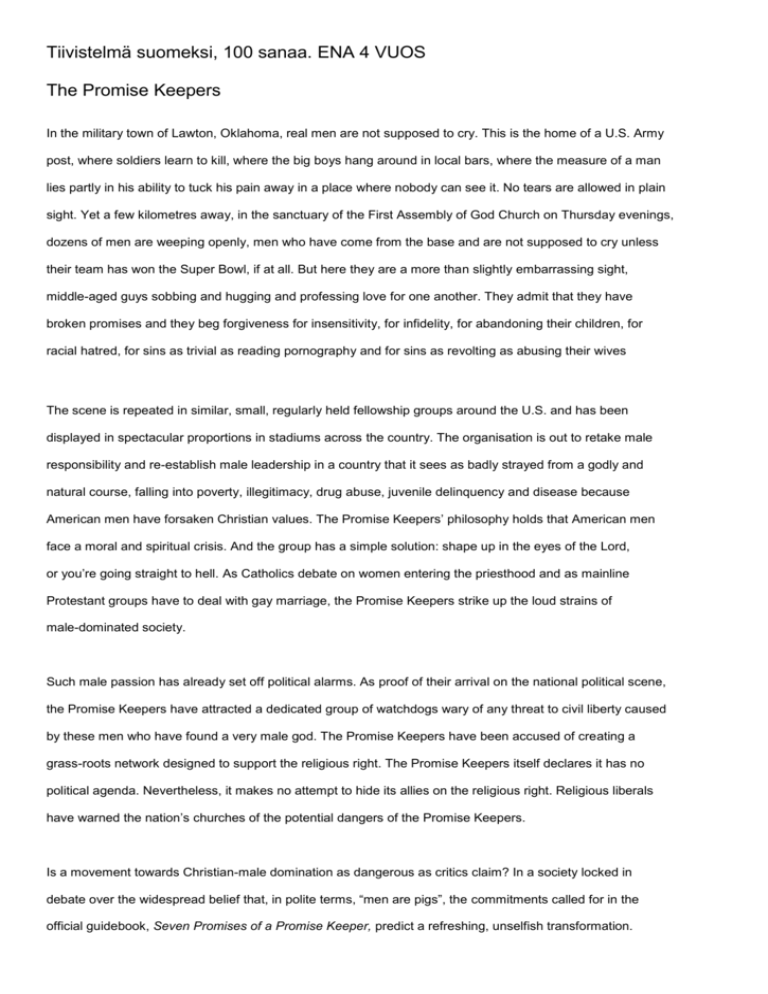Tiivistelmä suomeksi, 100 sanaa. ENA 4 VUOS The Promise
advertisement

Tiivistelmä suomeksi, 100 sanaa. ENA 4 VUOS The Promise Keepers In the military town of Lawton, Oklahoma, real men are not supposed to cry. This is the home of a U.S. Army post, where soldiers learn to kill, where the big boys hang around in local bars, where the measure of a man lies partly in his ability to tuck his pain away in a place where nobody can see it. No tears are allowed in plain sight. Yet a few kilometres away, in the sanctuary of the First Assembly of God Church on Thursday evenings, dozens of men are weeping openly, men who have come from the base and are not supposed to cry unless their team has won the Super Bowl, if at all. But here they are a more than slightly embarrassing sight, middle-aged guys sobbing and hugging and professing love for one another. They admit that they have broken promises and they beg forgiveness for insensitivity, for infidelity, for abandoning their children, for racial hatred, for sins as trivial as reading pornography and for sins as revolting as abusing their wives The scene is repeated in similar, small, regularly held fellowship groups around the U.S. and has been displayed in spectacular proportions in stadiums across the country. The organisation is out to retake male responsibility and re-establish male leadership in a country that it sees as badly strayed from a godly and natural course, falling into poverty, illegitimacy, drug abuse, juvenile delinquency and disease because American men have forsaken Christian values. The Promise Keepers’ philosophy holds that American men face a moral and spiritual crisis. And the group has a simple solution: shape up in the eyes of the Lord, or you’re going straight to hell. As Catholics debate on women entering the priesthood and as mainline Protestant groups have to deal with gay marriage, the Promise Keepers strike up the loud strains of male-dominated society. Such male passion has already set off political alarms. As proof of their arrival on the national political scene, the Promise Keepers have attracted a dedicated group of watchdogs wary of any threat to civil liberty caused by these men who have found a very male god. The Promise Keepers have been accused of creating a grass-roots network designed to support the religious right. The Promise Keepers itself declares it has no political agenda. Nevertheless, it makes no attempt to hide its allies on the religious right. Religious liberals have warned the nation’s churches of the potential dangers of the Promise Keepers. Is a movement towards Christian-male domination as dangerous as critics claim? In a society locked in debate over the widespread belief that, in polite terms, “men are pigs”, the commitments called for in the official guidebook, Seven Promises of a Promise Keeper, predict a refreshing, unselfish transformation. Promise No. 7 commits members to obey the great commandment in the Gospel of Mark: “Love the Lord your God with all your heart and with all your soul and with all your mind and with all your strength … and Love your neighbour as yourself.” It is a sentiment both harmless and supportive. But there is another piece of Scripture in Promise No. 7, which provides fuel to feminists and other critics of the Promise Keepers. It is from the Gospel of Matthew: “Therefore, go and make disciples of all nations, baptizing them in the name of the Father and of the Son and of the Holy Spirit, and teaching them to obey everything I have commanded you.” The Bible verse raises two questions: Who on earth will command? And who must obey? The National Organization for Women has passed a resolution declaring the Promise Keepers “the greatest danger to women’s rights.” The group’s mission is unclear and unsettling regarding its relationship with women. It calls for men to take “spiritual leadership” over their wives and suggests that women follow. Feminists say this is a throwback to the days of women’s servitude and oppression. Some women, nevertheless, seem to support the Promise Keepers and the wives of the Promise Keepers don’t seem to be complaining much about their husbands. The organization seeks to lead men to Christ by creating a climate in which men are more likely to view themselves and their lives more honestly. Women are seen as an obstacle to a man’s immediate soul-searching and are not invited into the Promise Keepers’ rallies, prayer groups or other religious activities. “When a man sees a stadium full of other men crying, he figures it’s alright to cry too. With women there, he might not get that honest,” the Promise Keepers say. Mr McCartney, the founder of the group, insists that a man’s “leadership” at home actually translates into “servanthood” rather than domination. “You can talk about it, but the man has a responsibility before God. He must stand before God and give an account. Did you take spiritual leadership in your home? You know what a woman is told in the Bible? Respect your husband. The way she would do that is that she would come alongside him and let him take the lead, and he in turn would lay down his life. He would serve her affectionately and tenderly.” The Promise Keepers seem to concentrate on framing the issues of gender and race in the most biblical of contexts. And while Holy Scripture can work miracles in individual souls, it can also alienate non-Christians and create confusion and paranoia in an already heavily secularized America. However, the men involved at the grass roots see only their own souls at stake. The organization has managed to touch the hearts of men who don’t consider themselves religious at all. (Adapted from Real men can cry, Time, October 1997)









